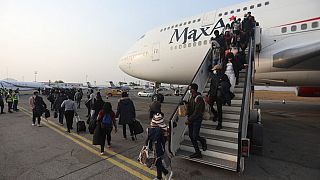Africa agenda
Almost 300 people returned from Tunisia to Mali and Ivory Coast on Saturday after boarding repatriation flights, fearful of a wave of violence since the president launched a tirade against migrants.
Last month President Kais Saied ordered officials to take "urgent measures" to tackle irregular migration, claiming without evidence that "a criminal plot" was underway "to change Tunisia's demographic makeup".
Saied claimed that migrants were behind most crime in the North African country, fuelling a spate of sackings, evictions and attacks.
The African Union expressed "deep shock and concern" at his remarks, while governments in sub-Saharan Africa scrambled to bring home hundreds of frightened nationals who flocked to their embassies for help.
A group of 135 Malian nationals arrived in Bamako late Saturday, an AFP journalist reported.
They were welcomed by Defence Minister Sadio Camara and the minister for Malians living abroad Alhamdou Ag Ilyene, who explained that Mali's government had chartered their plane.
The minister said 97 men, 25 women and 13 children had been on board.
In Abidjan, a flight carrying 145 passengers also landed late on Saturday. They were welcomed by Prime Minister Patrick Achi and several ministers, an AFP journalist said.
They were taken to a reception centre, where they will spend three days receiving medical and psychological care before being reunited with their families.
- 'I'm not safe' -
Early this morning, an AFP photographer saw the Malian group leave their embassy in Tunis, boarding buses to the airport where a chartered plane awaited.
"The Tunisians don't like us, so we are forced to leave," Bagresou Sego told AFP before boarding the bus.
Adrahmen Dombia, who arrived in Tunisia four years ago, said he had to stop his university studies mid-year. "I'm going back because I'm not safe."
Another Malian migrant, Baril, said he had a permit to stay in Tunisia but joined the repatriation flight anyway.
"We ask President Kais Saied with great respect to consider our other brothers and treat them well," he told AFP.
A first group of 50 Guineans was flown home on Wednesday.
According to official figures, there are around 21,000 undocumented migrants from other parts of Africa in Tunisia, a country of around 12 million people.
Critics accuse Saied, who has seized almost total power since July 2021, of seeking to install a new dictatorship in the country, which is grappling with inflation and shortages of essential goods.
- Vigilante violence -
Since Saied gave his speech on February 21, rights groups have reported a spike in vigilante violence, including the stabbings of African migrants.
Jean Badel Gnabli, head of an association of Ivorian migrants in Tunisia, told AFP from the airport that the group leaving on Saturday had "spent the night in hotels".
The whole community was living in fear, he said earlier. "They feel like they've been handed over to mob justice."
Ambassador Savane said 1,100 Ivorians out of around 7,000 in Tunisia had applied to be repatriated.
Michael Elie Bio Vamet, head of an Ivorian student association, said 30 students had signed up for the repatriation flight despite having permits to stay.
"They don't feel comfortable," he told AFP by phone. "Some of them were victims of racist acts. Some are at the end of their studies, but others discontinued.
"There are attacks almost every day, threats, they are even being kicked out by landlords or physically attacked," he added.
- Dozens arrested -
Many African migrants in Tunisia lost their jobs and homes overnight.
Dozens were arrested after identity checks, and some are still being detained.
Migrants whose countries have embassies in Tunisia rushed to them for help.
The embassies of Ivory Coast and Mali provided emergency accommodation this week for dozens of their citizens evicted from their homes, including young children.
Citizens of other African countries whose countries have no diplomatic representation in Tunisia set up makeshift camps outside the Tunis offices of the International Organization for Migration.
Among those heading home are dozens of fee-paying or scholarship students who were enrolled in Tunisian universities and in the country legally.












Go to video
First Malaria treatment for babies approved
02:21
Ivorian diaspora in Paris demands free and inclusive elections ahead of October vote
00:50
Ons Jabeur retires from Wimbledon Opener due to breathing issues
01:14
Mali and Russia sign deal on nuclear energy during Goïta's Moscow visit
00:00
Ivory Coast: Laurent Gbagbo and Tidjane Thiam's parties form a united opposition front
01:09
Former Tunisian president Moncef Marzouki sentenced to 22 years in absentia